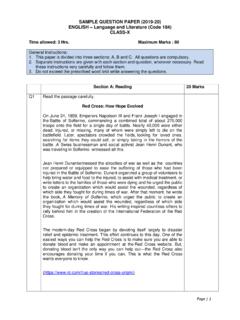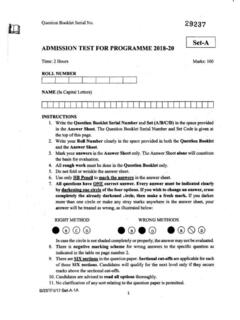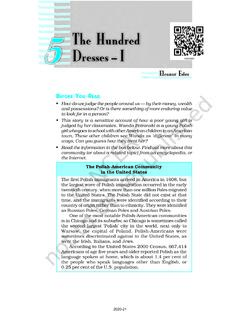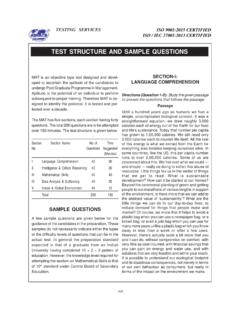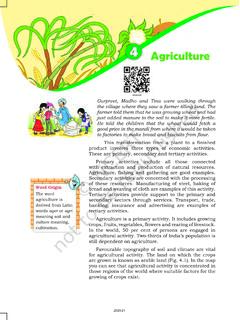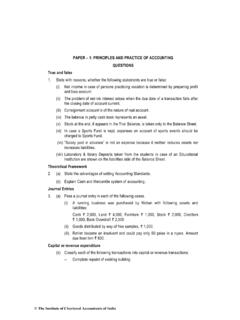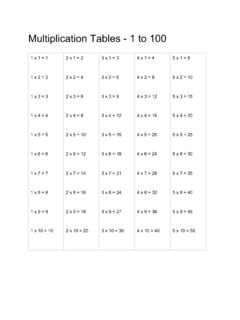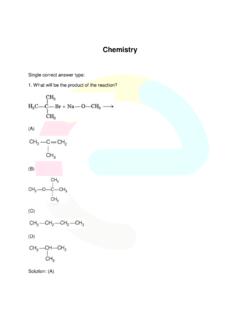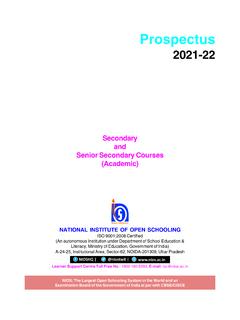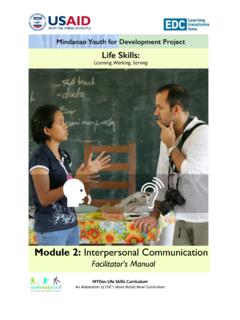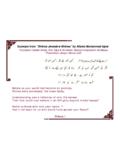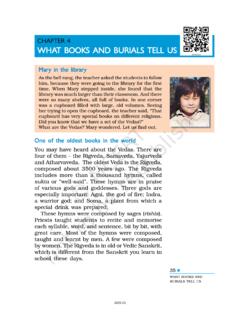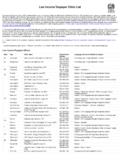Transcription of 10 India After Independence
1 10 India After Independence A New and Divided Nation When India became independent in August 1947, it faced a series of very great challenges. As a result of Partition, 8 million refugees had come into the country from what was now Pakistan. These people had to be found homes and jobs. Then there was the problem of the princely states, almost 500 of them, each ruled by a maharaja or a nawab, each of whom had to be persuaded to join the new nation. The problems of the refugees and of the princely states had to be addressed immediately. In the longer term, the new nation had to adopt a political system that would best serve the hopes and expectations of its population. Fig. 1 Mahatma Gandhi's ashes being immersed in Allahabad, February 1948. Less than six months After Independence the nation was in mourning. On 30 January 1948, Mahatma Gandhi was assassinated by a fanatic, Nathuram Godse, because he disagreed with Gandhiji's conviction that Hindus and Muslims should live together in harmony.
2 That evening, a stunned nation heard Jawaharlal Nehru's moving statement over All India Radio: Friends and comrades, the light has gone out of our lives and there is darkness everywhere our beloved leader the Father of the Nation is no more.. 128 OUR PASTS III. 2020-21. India 's population in 1947 was large, almost 345. million. It was also divided. There were divisions Activity Imagine that you are a between high castes and low castes, between the British administrator majority Hindu community and Indians who practised leaving India in 1947. other faiths. The citizens of this vast land spoke many You are writing a letter different languages, wore many different kinds of dress, home where you discuss ate different kinds of food and practised different what is likely to happen professions. How could they be made to live together in to India without the one nation-state? British. What would be To the problem of unity was added the problem of your views about the development.
3 At Independence , the vast majority of future of India ? Indians lived in the villages. Farmers and peasants depended on the monsoon for their survival. So did the non-farm sector of the rural economy, for if the crops failed, barbers, carpenters, weavers and other service groups would not get paid for their services either. In the cities, factory workers lived in crowded slums with little access to education or health care. Clearly, the new nation had to lift its masses out of poverty by increasing the productivity of agriculture and by promoting new, job-creating industries. Unity and development had to go hand in hand. If the divisions between different sections of India were not healed, they could result in violent and costly conflicts high castes fighting with low castes, Hindus with Muslims and so on. At the same time, if the fruits of economic development did not reach the broad masses of the population, it could create fresh divisions for example, between the rich and the poor, between cities and the countryside, between regions of India that were prosperous and regions that lagged behind.
4 A Constitution is Written Between December 1946 and November 1949, some three hundred Indians had a series of meetings on the country's political future. The meetings of this Constituent Assembly were held in New Delhi, but the participants came from all over India , and from different political parties. These discussions resulted in the framing of the Indian Constitution, which came into effect on 26 January 1950. One feature of the Constitution was its adoption of universal adult franchise. All Indians above the age of 21 would be allowed to vote in state and national elections. This was a revolutionary step for never before Franchise The right to had Indians been allowed to choose their own leaders. vote In other countries, such as the United Kingdom and India After Independence 129. 2020-21. Fig. 2 Jawaharlal Nehru the United States, this right had been granted in stages. introducing the resolution that First only men of property had the vote. Then men who outlined the objectives of the Constitution were educated were also added on.
5 Working-class men got the vote only After a long struggle. Finally, After a bitter struggle of their own, American and British women were granted the vote. On the other hand, soon After Independence , India chose to grant this right to all its citizens regardless of gender, class or education. A second feature of the Constitution was that it guaranteed equality before the law to all citizens, regardless of their caste or religious affiliation. There were some Indians who wished that the political system of the new nation be based on Hindu ideals, and that India itself be run as a Hindu state. They pointed to the example of Pakistan, a country created explicitly to protect and further the interests of a particular religious community the Muslims. However, the Indian Prime Minister, Jawaharlal Nehru, was of the opinion that India could not and must not become a Hindu Pakistan . Besides Muslims, India also had large populations of Sikhs and Christians, as well as many Parsis and Jains.
6 Under the new Constitution, they would have the same rights as Hindus the same opportunities when it came to seeking jobs in government or the private sector, the same rights before the law. A third feature of the Constitution was that it offered special privileges for the poorest and most disadvantaged 130 OUR PASTS III. 2020-21. Source 1. Indians. The practice of untouchability, described as a slur and a blot on the fair name of India , was abolished. Hindu temples, previously open to We must give them only the higher castes, were thrown open to security and rights all, including the former untouchables. After a long debate, the Constituent Assembly also Nehru wrote in a letter to recommended that a certain percentage of seats the Chief Ministers of states: in legislatures as well as jobs in government be reserved for members of the lowest castes. It had .. we have a Muslim been argued by some that Untouchable or as they minority who are so large in numbers that they were now known, Harijan, candidates did not have cannot, even if they want, good enough grades to get into the prestigious go anywhere else.
7 That is a Indian Administrative Service. But, as one member basic fact about which of the Constituent Assembly, Khandekar, there can be no argument. argued, it was the upper castes who were Whatever the provocation responsible for the Harijans being unfit today . from Pakistan and Addressing his more privileged colleagues, whatever the indignities Khandekar said: and horrors inflicted on We were suppressed for thousands of years. non-Muslims there, we You engaged us in your service to serve your have got to deal with this own ends and suppressed us to such an minority in a civilised extent that neither our minds nor our bodies manner. We must give and nor even our hearts work, nor are we them security and the able to march forward. rights of citizens in a democratic State. Along with the former Untouchables, the adivasis or Scheduled Tribes were also granted reservation in seats and jobs. Like the Scheduled Castes, these Indians too had been deprived and discriminated against.
8 The tribals had been deprived of modern health care and education, while their lands and forests had been taken away by more powerful outsiders. The new privileges granted them by the Constitution were meant to make amends for this. The Constituent Assembly spent many days Activity Imagine a conversation discussing the powers of the central government between a father and son versus those of the state governments. Some in a Muslim family. After members thought that the Centre's interests Partition, the son thinks it should be foremost. Only a strong Centre, it was would be wiser for them to argued, would be in a position to think and plan move to Pakistan while the for the well-being of the country as a whole . Other father believes that they members felt that the provinces should have should continue to live in greater autonomy and freedom. A member from India . Taking information Mysore feared that under the present system from the chapter so far democracy is centred in Delhi and it is not allowed (and Chapter 11), act out to work in the same sense and spirit in the rest of what each would say.
9 The country . A member from Madras insisted that India After Independence 131. 2020-21. the initial responsibility for the well-being of the people of the provinces should rest with the Provincial Governments . The Constitution sought to balance these competing claims by providing three lists of subjects: a Union List, with subjects such as taxes, defence and foreign affairs, which would be the exclusive responsibility of the Centre; a State List of subjects, such as education and health, which would be taken care of principally by the states; a Concurrent List, under which would come subjects such as forests and agriculture, in which the Centre and the states would have joint responsibility. Another major debate in the Fig. 3 Dr Ambedkar Constituent Assembly concerned language. Many Dr. Ambedkar (1891-1956), members believed that the English language should respectfully referred to as leave India with the British rulers. Its place, they Babasaheb, belonged to a argued, should be taken by hindi .
10 However, those who Marathi-speaking dalit family. A lawyer and economist, he is did not speak hindi were of a different opinion. Speaking best known as a revered leader in the Assembly, Krishnamachari conveyed a of the Dalits and the father of warning on behalf of people of the South , some of whom the Indian Constitution threatened to separate from India if hindi was imposed on them. A compromise was finally arrived at: namely, that while hindi would be the official language of India , English would be used in the courts, the services, and communications between one state and another. Many Indians contributed to the framing of the Constitution. But perhaps the most important role was played by Dr Ambedkar, who was Chairman of the Drafting Committee, and under whose supervision the document was finalised. In his final speech to the Constituent Assembly, Dr Ambedkar pointed out that political democracy had to be accompanied by economic and social democracy.

